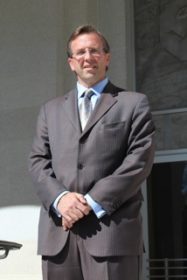
In light of the current state of emergency in California that Governor Newsom declared to respond to the novel coronavirus, and the series of orders that he has issued since, I think it’s valuable to explore where the Governor’s emergency powers come from and what the limitations on those powers are.
While the Governor’s powers are derived first from the state’s constitution, their emergency powers are primarily found in statute. And while we have not yet run into the issue of martial law in California in response to COVID-19, Article V Section 7 of the California Constitution does provide that “The Governor is the state militia’s Commander In Chief and he or she has the authority to use the militia in order to execute the laws.”
It is important to note that, because the extraordinary powers granted to the Governor in a state of emergency are provided by statute, the Governor does not have the authority to suspend any provisions of the Constitution. Any rights that are contained in our state’s constitution are still in full force and effect. They cannot be trumped by a state of emergency.
There are three types of emergency that the Governor can declare, a state of war emergency, a statewide state of emergency, or a local state of emergency. Government Code section 8558 defines when the Governor can call a state of emergency, which states that it’s the existence of conditions of disaster or extreme peril to the safety of person and property within the state caused by conditions such as air pollution, fire, flood, storm, epidemic, riot, drought, cyberterrorism, sudden and severe energy shortage, plant or animal infestation, disease, earthquake, or other conditions other than conditions resulting from a labor controversy or conditions causing a state of war.
You may have seen earlier this week about the state’s efforts to procure hotel space to house the homeless and perhaps house coronavirus patients. Statute provides that the state can commandeer private property or personnel, but it must pay for it. California law essentially allows the Governor to commandeer any private property or personnel with one exception. The Governor may not commandeer newspapers, wire services, or radio or TV stations during a state of emergency.
The Governor can also suspend any statute or regulatory statute prescribing the procedure for conduct of state businesses where the Governor determines that strict compliance with the statute would in any way prevent, hinder, or delay the mitigation of the effects of the emergency. An example of this is Governor Newsom’s move to suspend the normal one week waiting period for individuals to file unemployment insurance claims, allowing individuals to file those claims much faster.
